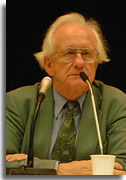| ホーム >> 研究会報告 >> 国際シンポジウム「人間の安全保障」Top >>ガルトゥング講演 |
 |
ヨハン・ガルトゥング ノルウェー出身、平和学者。TRANSCEND創始者、代表者。 主な著作(日本語訳) 『グローバル化と知的様式 社会科学方法論についての七つのエッセー』(東信堂、2004年) 『ガルトゥング平和学入門』(共編著、法律文化社、2003年) 『平和的手段による紛争の転換 超越法』(平和文化、2000年) TRANSCEND website : http://www.transcend.org |
3. Human Security = Human + Security
Thesis: Rwanda 1994 gave the option of doing nothing a bad name. The (very) soft military approach in Bosnia (Srebrenica) 1995 gave UN-led peace-keeping a bad name. The hard military US-led NATO war 1999 against Serbia to protect the Kosovars gave humanitarian assistance a bad name. But the succesful hard nonviolent approach against Milosevic fall 1999(20) --seen as illegitimate regardless of the truth about those elections--did not give nonviolence a good name, the approach being too extra-paradigmatic in a US-led world seeking military legitimacy.(21) In short, time for a new concept. The UN Commission On Human Security (CHS), launched in June 2001, was co-chaired by the former UN High Commissioner for Refugees Sadako Ogata and Amartya Sen, holder of the Nobel prize in economic science.(22) The final report was presented to the UN Secretary-General on May 1 2003.(23) Some highlights from the important Report: - The international community urgently needs a new paradigm of security--(the state) often fails to fulfill its security obligations-and at times has even become a source of threats to its own people--attention must now shift from the security of the state to the security of the people--to human security. The operational part translates such ideas into ten points:
Very much of what has been mentioned is in the basic human needs tradition, like the four needs-classes presented in section [1] above: There is a focus on survival in terms of protection and security. There is a focus on wellness in terms of basic health care, basic education and minimum living standards. Trade, market and patent rights are qualified by "fair", to "benefit the poor" and "equitable". There is a focus on diverse identity, including global identity. Freedom is missing from these points, but is all over the report, very much based on one of the leading intellectuals of our times, co-chair Amartya Sen, and his seminal book Development as Freedom.(24) And most importantly: "the range of actors is expanded beyond the state alone", above all bringing in empowered individuals all over. No doubt "human security" is a formula giving "human" to the basic needs approach, developing that approach further. Does it also give "security" to the state, as indicated in [1] above? And how? The report legitimizes the word "security" by giving it the connotation "human". What then happens is beyond the pages of the report. We would expect the state system with its monopoly on the violent means of security to use this legitimation, justifying intervention inside other states in the name of "human security". And we would also expect some of them to use "security" in the broad sense as a cover for other goals, in the national interest tradition. NEXT >>
|
|
copyright (c) 2004-2005 地域研究による 「人間の安全保障学」の構築プロジェクト All rights reserved. |